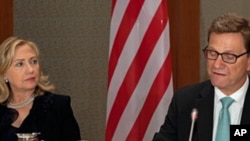Foreign ministers from a number of countries gathered on the sidelines of the U.N. General Assembly Thursday to discuss their strategy for establishing sustainable economic growth in Afghanistan as a way to get that country on the road to peace and prosperity.
The high-level meeting brought together Afghanistan, its regional neighbors and members of the U.S.-led coalition who have been fighting the Taliban for the last 10 years.
The U.S.-led international coalition is entering a new phase in its engagement in Afghanistan, as it gets ready to withdraw its troops in 2014.
German Foreign Minister Guido Westerwelle, who co-hosted Thursday’s meeting with U.S. Secretary of State Hillary Clinton, said that as troops are drawn down, the focus would shift towards long-term political and economic support in an initiative called the new Silk Road - a reference to Afghanistan’s historical place in the heart of that ancient trade route.
“The so-called new Silk Road initiative tries to build transportation, trade and energy links in Central and South Asia as a way not only to reinvent and change tradition, but also to support the rebuilding of Afghanistan today," said Westerwelle. "There are already proposals for concrete projects such as a pipeline or roads which we supported.”
Secretary Clinton said sustainable prosperity in Afghanistan would help undercut the appeal of extremism as well as benefit the region as a whole.
“Lasting stability and security go hand-in hand with economic opportunity," said Clinton. "People need a realistic hope for a better life, for a job, for a chance to provide for their family and that is especially true in Afghanistan. For political reconciliation to succeed Afghans must be able to envision a more prosperous, peaceful future.”
Afghanistan is still struggling with insurgents, suicide bombings and other insecurity issues. The assassination this week of former president and head of the government's peace council Burhanuddin Rabbani was a blow to reconciliation efforts. But Afghan Foreign Minister Zalmai Rassoul told reporters after the meeting that the peace process would go on.
“Professor Rabbani was killed because he was starting to be successful in the peace process," said Rassoul. "If he was failing, nobody would have been interested in him. The peace process will go on. And the fact that he was killed showed that the enemy has started to have fear that this process might succeed.”
Rassoul said despite attacks and other problems, the transition process is progressing. He said he expects Afghanistan will need international assistance to train and equip security forces, in addition to economic help, but that the government would take over full control when international forces withdraw.
International Community Looks to Afghan Economic Stability




